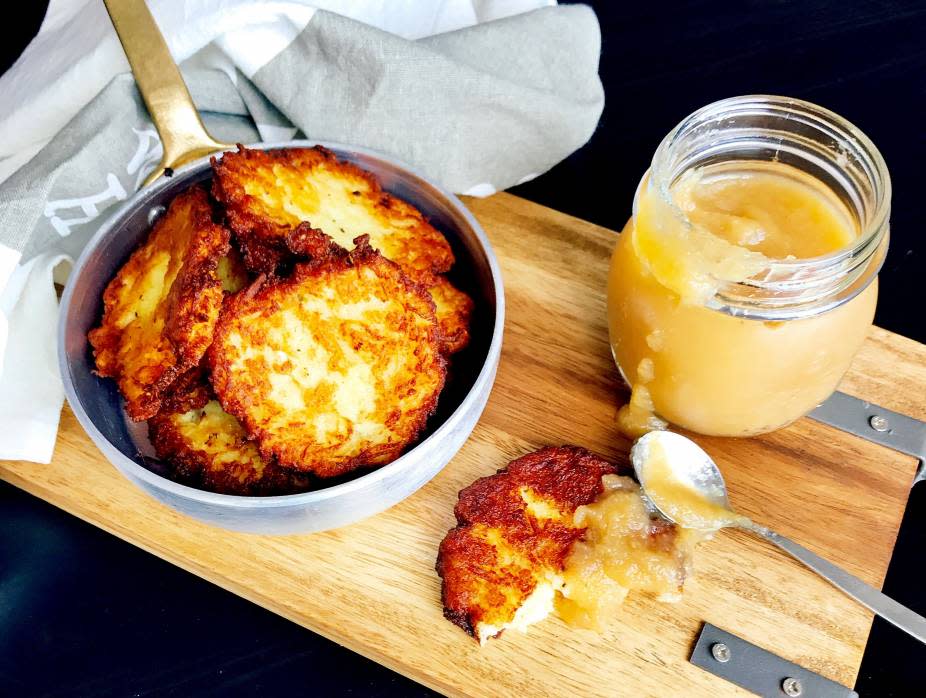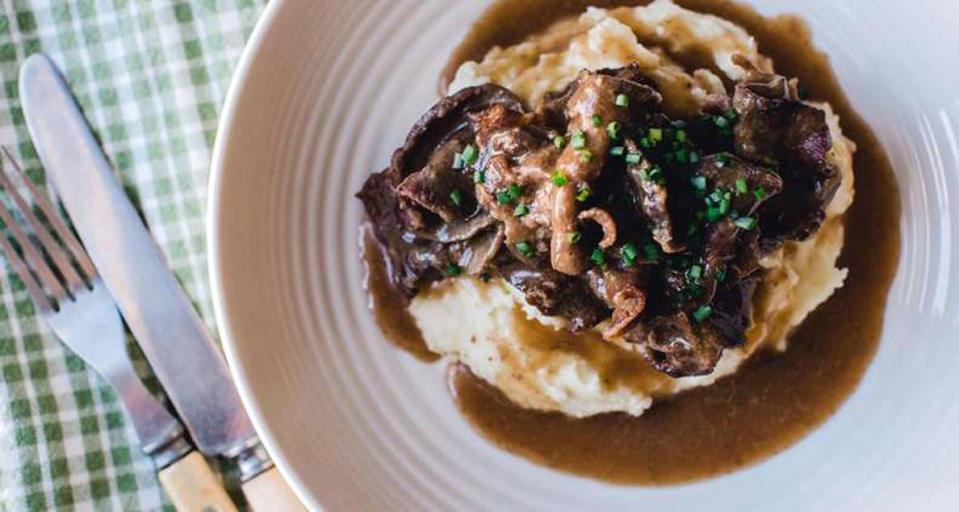Not just latkes: What this Jewish chef wants you to know about Hanukkah foods

Is there a faith or cultural tradition that doesn’t center around food? Probably not many. And when it comes to the Jewish holiday of Hanukkah, which commemorates the rededication of the Second Temple of Jerusalem by lighting candles each day during an eight-day festival, food is the “number one thing,” says chef Noam Bilitzer.
I recently sat down with Bilitzer, who owns MeeshMeesh Mediteranean at 636 E. Market St. in Louisville's NuLu neighborhood, and was born and spent the first part of his childhood in Israel. Though he doesn’t describe himself as overtly religious, the foods of his family’s cultural and faith tradition of Judaism still play a starring role this time of year, both at home and at his restaurant. In 2023, Hanukkah is celebrated from Dec. 7-15.
There are approximately 18,300 adults and children living in Louisville who identify as Jewish, according to a 2021-22 study by Brandeis University, so it's not surprising that more people aren't familiar with the traditional foods of the holiday season beyond latkes and matzo ball soup. And the more I heard from Bilitzer, the more it’s clear that’s a shame.
One thing we may be doing is painting the foods of the holiday — and of Judaism — with the same brush, but that’s far from reality, Bilitzer explained.
“The diaspora is huge,” he says, and (like many others), Jewish people’s foods draw on the region where their families have landed. Take matzo ball soup for example, which is traditionally made with matzah meal, beaten eggs, water, and a fat. I bet you don’t imagine chili pepper and harissa in it, but for Moroccan Jews, Bilitzer says, they bring the heat.
Even within families, when couples are married, they can bring their traditions to the kitchen, which results in a giant melting pot, he says. Let alone when you throw a chef, like him, into the mix who puts his spin on classic dishes, as well.
Potato latkes, arguably the most famous of the Hanukkah dishes, can vary widely. Unlike the southern potato pancakes I grew up with, made with leftover mashed potatoes, latkes are built on raw, usually grated potatoes, Bilitzer says. For his latkes, he likes to incorporate other root vegetables, like butternut squash, celery root, or carrots, along with raw onions and egg before frying them in duck fat or clarified butter.
You can enjoy Bilitzer's latkes at MeeshMeesh in December, or try your hand with his recipe (see below). I had to ask though: as a non-Jewish person, could it be perceived as cultural appropriation if I make latkes at home?
“Absolutely not,” he says. “No. [The] food is good, so you should make it. End of story. That's how I look at it."
Traditions evolve, as well, he says. While brisket may be a beef dish typically associated with the Hanukkah season, in his family, they prepare beef tongue. Because that’s an ingredient lumped in with offal, it’s not often enjoyed by many Americans (aside from lengua tacos, maybe!), he says. But it’s considered a delicacy for some, he says. In the Ashkenazi Jewish sect, those who descended from Jews who lived in Central or Eastern Europe, for example, "it’s like a prize cut.”
“It was one of those things that we did on Rosh Hashana or Hanukkah,” Bilitzer added. “Anytime my mom was cooking for a lot of people because it's a luxury.”
Not buying it yet?

“Honestly, it's super tender and great,” Bilitzer says of beef tongue. “Preparing it can be a little intimidating because it is a giant tongue. But basically, you blanch it in boiling water for a few minutes. And then you cool it down and it has an exterior kind of skin to it that you peel off. And then you just treat it like brisket. So caramelized onions or carrots, lots of red wine, beef stock, different spices and … braise it in the oven for a few hours. Get it nice and tender and then slice it just like you would with roasted brisket.”
On a sweeter note, another family tradition — and one he’s also bringing to MeeshMeesh this month — is his mom’s apple cake. Bilitzer uses apples from Huber's Orchard for his version, which may be akin to a pineapple upside-down cake, he says.
At the end of the day, what do the foods of Hanukkah represent to this chef?
“Joyful,” he says. “Inspiring. Comforting.”
I think we can all get behind that.
Tell Dana! Send your restaurant “Dish” to Dana McMahan at thecjdish@gmail.com and follow @elleferafera on Instagram.
Noam Bilitzer's Butternut Latkes
Ingredients
500 g russet potato shredded (4-5 large russet potatoes)
100 g butternut squash, shredded
200 g yellow onion shredded
10 g onion powder
5 g garlic powder
5 g salt
5 g black pepper
5 g vegetarian chicken bouillon (Try the Osem brand, which can be found in most kosher sections at grocery stores)
4 large eggs
5 g baking powder
5 g baking soda
2 cups clarified butter, ghee or duck fat
Directions
In a large bowl, submerge the grated potato and butternut squash in cold water. Lift the potato and squash out to rinse excess starch from the water and into a strainer lined with a kitchen towel.
Twist the mixture in the towel and squeeze to remove excess water.
Discard the water, however, leave any potato starch left in the bottom of the bowl.
Combine the remaining ingredients excluding the cooking fat and mix until everything is combined.
In a large sauce pan or sauté pan over medium heat add about 1 inch of desired cooking fat and allow to heat up.
Using a perforated spoon, ball the latkes mixture and squeeze excess liquid before placing into the heated pan. The center of the latke should be thicker than the ends to create a more diverse textured bite.
Cook on each side for 2-3 minutes or until maple brown on the outside and the center is steamy.
Take the time to cook one or two latkes first and adjust the seasoning, if needed.
Enjoy with labneh, creme fraiche or sour cream and apple sauce.
This article originally appeared on Louisville Courier Journal: Traditional Hanukkah foods: latkes, beef brisket, matzo ball soup

